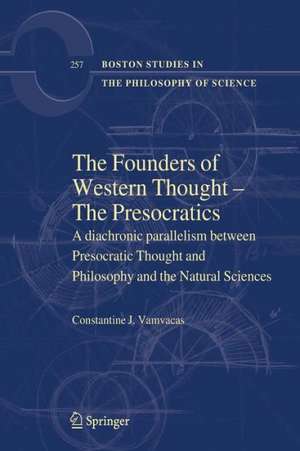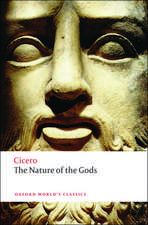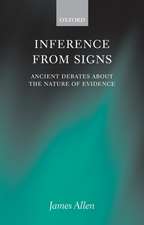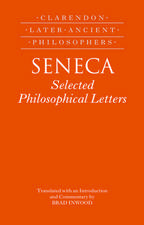The Founders of Western Thought – The Presocratics: A diachronic parallelism between Presocratic Thought and Philosophy and the Natural Sciences: Boston Studies in the Philosophy and History of Science, cartea 257
Autor Constantine J. Vamvacasen Limba Engleză Paperback – 30 oct 2014
| Toate formatele și edițiile | Preț | Express |
|---|---|---|
| Paperback (1) | 641.20 lei 6-8 săpt. | |
| SPRINGER NETHERLANDS – 30 oct 2014 | 641.20 lei 6-8 săpt. | |
| Hardback (1) | 647.59 lei 6-8 săpt. | |
| SPRINGER NETHERLANDS – 8 iun 2009 | 647.59 lei 6-8 săpt. |
Din seria Boston Studies in the Philosophy and History of Science
- 18%
 Preț: 944.19 lei
Preț: 944.19 lei - 15%
 Preț: 646.75 lei
Preț: 646.75 lei - 15%
 Preț: 646.75 lei
Preț: 646.75 lei - 15%
 Preț: 699.28 lei
Preț: 699.28 lei - 18%
 Preț: 736.50 lei
Preț: 736.50 lei -
 Preț: 500.02 lei
Preț: 500.02 lei - 15%
 Preț: 643.16 lei
Preț: 643.16 lei - 15%
 Preț: 650.69 lei
Preț: 650.69 lei - 15%
 Preț: 634.18 lei
Preț: 634.18 lei - 15%
 Preț: 642.68 lei
Preț: 642.68 lei -
 Preț: 391.40 lei
Preț: 391.40 lei -
 Preț: 383.33 lei
Preț: 383.33 lei - 18%
 Preț: 944.19 lei
Preț: 944.19 lei - 18%
 Preț: 955.56 lei
Preț: 955.56 lei - 15%
 Preț: 643.65 lei
Preț: 643.65 lei -
 Preț: 392.75 lei
Preț: 392.75 lei - 18%
 Preț: 1229.10 lei
Preț: 1229.10 lei - 18%
 Preț: 1238.23 lei
Preț: 1238.23 lei - 18%
 Preț: 951.29 lei
Preț: 951.29 lei - 18%
 Preț: 1223.25 lei
Preț: 1223.25 lei - 18%
 Preț: 1225.79 lei
Preț: 1225.79 lei - 18%
 Preț: 1226.42 lei
Preț: 1226.42 lei - 18%
 Preț: 1236.82 lei
Preț: 1236.82 lei - 15%
 Preț: 644.49 lei
Preț: 644.49 lei - 18%
 Preț: 1231.78 lei
Preț: 1231.78 lei - 15%
 Preț: 644.30 lei
Preț: 644.30 lei - 18%
 Preț: 957.62 lei
Preț: 957.62 lei - 18%
 Preț: 1222.49 lei
Preț: 1222.49 lei - 18%
 Preț: 947.50 lei
Preț: 947.50 lei - 18%
 Preț: 1833.95 lei
Preț: 1833.95 lei - 18%
 Preț: 1227.99 lei
Preț: 1227.99 lei - 18%
 Preț: 947.35 lei
Preț: 947.35 lei
Preț: 641.20 lei
Preț vechi: 754.36 lei
-15% Nou
Puncte Express: 962
Preț estimativ în valută:
122.71€ • 127.64$ • 101.30£
122.71€ • 127.64$ • 101.30£
Carte tipărită la comandă
Livrare economică 14-28 aprilie
Preluare comenzi: 021 569.72.76
Specificații
ISBN-13: 9789400789357
ISBN-10: 9400789351
Pagini: 312
Ilustrații: XVI, 293 p.
Dimensiuni: 155 x 235 x 16 mm
Greutate: 0.44 kg
Ediția:2009
Editura: SPRINGER NETHERLANDS
Colecția Springer
Seria Boston Studies in the Philosophy and History of Science
Locul publicării:Dordrecht, Netherlands
ISBN-10: 9400789351
Pagini: 312
Ilustrații: XVI, 293 p.
Dimensiuni: 155 x 235 x 16 mm
Greutate: 0.44 kg
Ediția:2009
Editura: SPRINGER NETHERLANDS
Colecția Springer
Seria Boston Studies in the Philosophy and History of Science
Locul publicării:Dordrecht, Netherlands
Public țintă
ResearchCuprins
The Juncture.- to the Presocratics.- Thales of Miletus (ca. 625–546 B.C.).- Anaximander of Miletus (ca. 610–546 B.C.).- Anaximenes of Miletus (ca. 585–525 B.C.).- Pythagoras of Samos (ca. 570–496 B.C.).- Xenophanes of Colophon (ca. 570–470, B.C..- Heraclitus of Ephesus (ca. 540–480 B.C.).- Parmenides of Elea (ca. 515–450 B.C.).- Empedocles of Acragas (ca. 494–434 B.C.).- Anaxagoras of Clazomenae (ca. 500–428 B.C.).- Democritus of Abdera (ca. 460–360 B.C.).- Epilogue.
Recenzii
From the reviews:
“Vamvacas provides a very neat survey of presocratic philosophers in chronological order detailing their contributions to modern science. … provide a fairly lucid introduction to presocratic thought. The book was originally written in Greek in 2001 and has been translated in a manner that is easily accessible to non-historians, including Vamvacas’ desired scientific readership.” (Luciano Boschiero, Metascience, Vol. 19 (3), November, 2010)
“Vamvacas provides a very neat survey of presocratic philosophers in chronological order detailing their contributions to modern science. … provide a fairly lucid introduction to presocratic thought. The book was originally written in Greek in 2001 and has been translated in a manner that is easily accessible to non-historians, including Vamvacas’ desired scientific readership.” (Luciano Boschiero, Metascience, Vol. 19 (3), November, 2010)
Textul de pe ultima copertă
There are two main points within this book: Firstly, to make the founding and evolution of Western thought accessible to the reflective man of our day, since the spirit of the Presocratics – although it is considered to constitute a true intellectual revolution - remains unknown to the broader community and secondly to shed greater light – probably for the first time - on the scientific dimension of the Presocratics’ work, and show its timeless value.
This book is a balanced interdisciplinary philosophic-scientific presentation of the evolution of Western thought through the presocratic tradition, where the synthesis of rationality and intuition – rather than their opposition - is the key to answering all questions of science, as we now understand the them. It is a book that investigates the
roots of Western science and philosophy, where probably for the first time a coherent interrelation is shown between presocratics’ thought and classical, as well as modern physical sciences.
It is addressed to the intelligent layperson as well as to the scientist of our time, who is interested in the emergence and evolution of Western thought – both scientific and philosophic. It will appeal to professionals and graduate students interested in general philosophy and philosophy of science.
This book is a balanced interdisciplinary philosophic-scientific presentation of the evolution of Western thought through the presocratic tradition, where the synthesis of rationality and intuition – rather than their opposition - is the key to answering all questions of science, as we now understand the them. It is a book that investigates the
roots of Western science and philosophy, where probably for the first time a coherent interrelation is shown between presocratics’ thought and classical, as well as modern physical sciences.
It is addressed to the intelligent layperson as well as to the scientist of our time, who is interested in the emergence and evolution of Western thought – both scientific and philosophic. It will appeal to professionals and graduate students interested in general philosophy and philosophy of science.
Caracteristici
The Presocratics were the first to interpret the universe critically, through a unique combination of rational thought, intuition and observation, excluding any intervention of divine or supernatural powers They appealed to man’s conscience, elevating man to a free and responsible position They posed the fundamental questions about ‘truth’, ‘being’, ‘becoming’ They laid the foundations for critical investigation, without which science would not exist


















